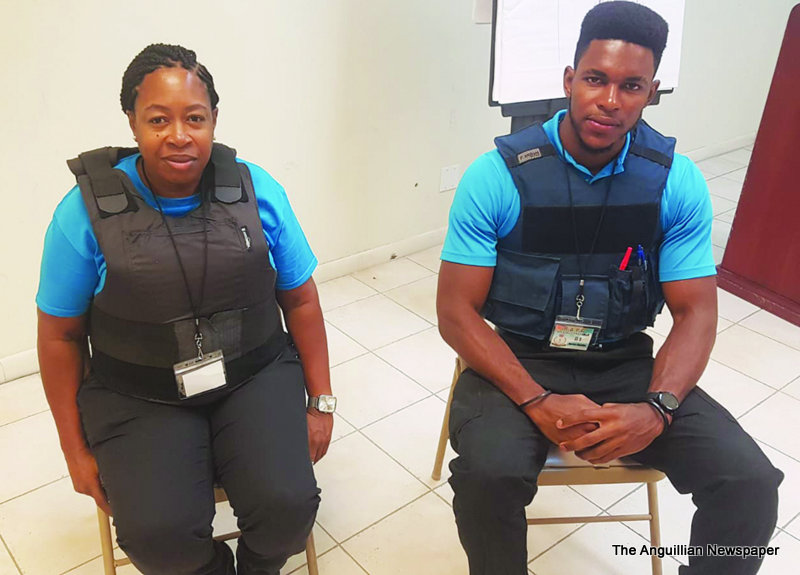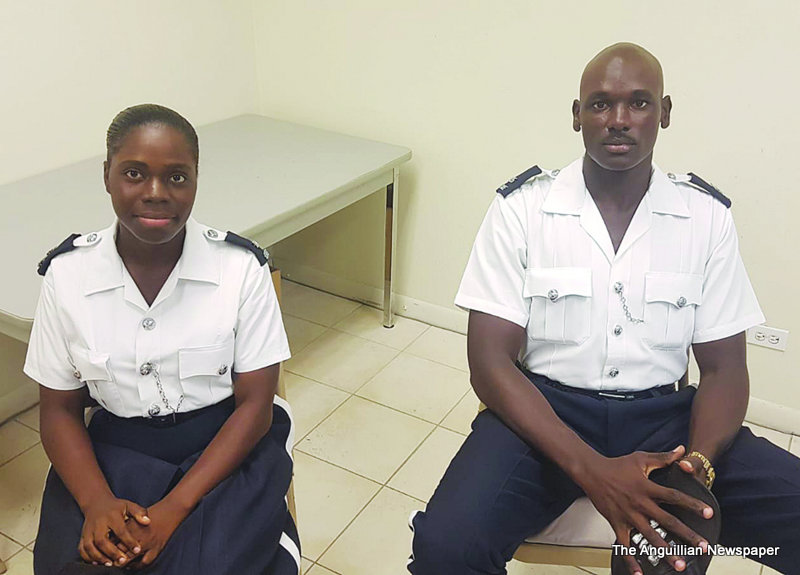
Special Constables, Kim Blaize-Reid
and Aaron Gumbs
Police Recruits, Kasian Thompson
and Curvis Marie
The Special Constables and the new Police Recruits in Anguilla have taken the opportunity to express their delight to be rendering national service at this time of their employment.
The Special Constables, numbering 42, are assisting with border protection in particular – and the 11 Police Recruits, now in training, are being taught various theoretical subjects and practical drills.
Both groups selected two of their number to speak to The Anguillian newspaper about themselves and on behalf of their colleagues. The first speaker was Special Constable Aaron Gumbs:
“I was in the UK and came to Anguilla just before the borders were closed,” he said. “My brother saw an advertisement in the newspaper about Special Constables, being needed for the Royal Anguilla Police Force, to provide border protection services. I was just sitting down in London with nothing to do so I decided to take up the opportunity. I was studying culinary arts at Middlesex University in Westminster which was on pause, because of the covid-19 disease, so I decided to come to Anguilla. The borders are now closed and I don’t know when I will be able to return to the UK – so working as a Special Constable in Anguilla is what I am doing for the moment.
“I think the duties we have been given are reasonable. We don’t have any firearms, or any way of defending ourselves, but I think border patrol, beat patrol or whatever else we are doing, is a good way to protect Anguilla.”
The other Special Constable, Kim Blaize-Reid, commented: “I received an advertisement via Whatsapp and I immediately applied for the position as Special Constable. I have been the Assistant Restaurant Manager/Trainer at Zemi Beach which closed on March 11. It is actually a great opportunity, and I am glad that I applied for the position. Since I have been working with the Police, it has been very rewarding in terms of the amount of things that we are learning – and that we are able to protect our country and people. We have done a three-day training which was very rigid and other training is ongoing, a day every week. It is mostly theory, and we are now going into the practical aspect in terms of protecting ourselves. That has been rewarding, and very much so.
“We have also been given opportunities to function in other capacities. For two days I served with the CID and I had a very productive time – and I must commend the officers for the work they do. I also like the humane approach they have in investigating and solving crimes within the island.
“This has been a great experience for me. I would like to say to my colleagues to make the most of this opportunity because it can be a potential chance for employment for them. It is an opportunity to represent their country; to learn as much as they can; put their best foot forward and make this opportunity count.”
The third speaker was Police Constable, Curvis Marie. “As far as I could remember I always wanted to be a Police Officer and I prepared for it over a number of years, and as soon as the opportunity came up I jumped at it and I was successful,” he stated. “I am still training. It is a good experience but a different experience. It takes a lot of determination and will power; a lot of drive and a whole heap of endurance. I feel prepared to be a Police Officer. We have one month and a few weeks more in training and, where I am at now, I feel very confident in my ability to perform my duties. The training is very effective and I encourage other persons to join.”
The fourth speaker was Police Constable Kasian Thompson of Jamaica. “I have been in Anguilla going into two years now,” she stated. “I was encouraged by my family to apply and I tried about three times before I got accepted. I am really grateful for the opportunity, and I am looking forward to seeing where I will go after training.
“As a woman, it is a bit daunting sometimes. This is a field which has traditionally been male dominated, and as a female one has to put out maximum effort at all times – and you cannot allow yourself to fall back in certain areas where the men and taller folk might have over you. You have to make up for it in other areas. One of my instructors is always telling me that ‘being a female, and with height disadvantage, you have to make up for it in other areas. You have to be the loudest, and put yourself out more.’ I am working on that.”
The four speakers were given a round of applause by their colleagues in the Police Headquarters Conference Room.








